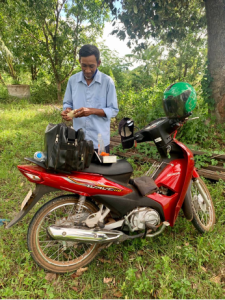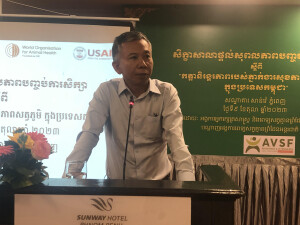From July to October 2023, our French member AVSF led a team of consultants to conduct a case study on Village Animal Health Workers (VAHWs) in Cambodia, as part of the USAID/BHA-funded project on CAHWs that VSF International is jointly implementing with the World Organisation for Animal Health (WOAH).
VAHWs, the Cambodian equivalent for community animal health workers, play a crucial role in supporting family farmers and improving animal health in rural areas. The study involved various stakeholders, including family farmers, VAHWs, district veterinarians, pharmacy managers, and officials from the central level, to assess the strengths and weaknesses of current VAHW programs.
The findings from this field study were presented at a national workshop held in Phnom Penh in October 2023, which brought together 58 participants, including representatives from 23 out of 24 provincial veterinary services. During the workshop, participants discussed the sustainability challenges facing VAHWs in Cambodia.
The Cambodian government has been supporting VAHW training and deployment for approximately 20 years, with legal recognition and official provisions for their training program, duration, and the use of registered trainers. In a context of increasingly frequent outbreaks of animal diseases, such as Avian Influenza and, more recently, African Swine Fever and Lumpy Skin Disease, the government has set a target of deploying 1 VAHW per village. A goal that seems almost reached, since as of 2020, 11,747 VAHWs were registered at the General Directorate of Animal Health and Production for 14,384 villages in Cambodia. However, in 2021, only 47% of them reported being active. A key question was raised by the participants during the workshop: “how to reactivate the less active VAHWs?”.
 VAHWs play a critical role in improving livestock health and productivity for small-scale farmers, thus contributing to household income and food security. They provide essential animal health services as independent workers and also collaborate with district veterinarians on a voluntary basis for data collection, vaccination campaigns, and disease control activities.
VAHWs play a critical role in improving livestock health and productivity for small-scale farmers, thus contributing to household income and food security. They provide essential animal health services as independent workers and also collaborate with district veterinarians on a voluntary basis for data collection, vaccination campaigns, and disease control activities.
Several challenges need to be addressed for them to sustainably play their role of local quality animal health service providers:
- Regular Training: VAHWs require access to regular refresher training tailored to the specific animal health needs of their communities, including new emerging diseases.
- Institutional Recognition: There is a need for increased recognition of VAHWs at the field level, along with incentives for active participation in government activities and visibility support to demonstrate their legitimacy to livestock keepers.
- Access to Quality Veterinary Pharmaceuticals: VAHWs need access to high-quality veterinary pharmaceuticals at fair prices to effectively carry out their duties.
- Awareness Among Livestock Keepers: There is a need to raise awareness among livestock keepers about the benefits and importance of disease prevention and control activities.
Overall, the most active and successful VAHWs are genuinely interested and committed to their work, always seeking opportunities to learn and expand their knowledge. To this regard, VAHW cooperatives have been an opportunity for VAHWs to strengthen their network, promote their services to farmers, and facilitate experience sharing and access to veterinary inputs. Involvement of VAHWs into broader Agriculture Cooperatives could therefore be seen as an opportunity to be scaled up in Cambodia.
 This article was made possible through support provided by the Bureau for Humanitarian Assistance, U.S. Agency for International Development, under the terms of Award No. 720BHA21IO00330 “Strengthening the enabling environment for Community Animal Health Workers (CAHWs) through development of competency and curricula guidelines”. This award is implemented by the World Organisation for Animal Health (WOAH, founded as OIE) in collaboration with Vétérinaires Sans Frontières International (VSF-Int). The opinions expressed in this article are those of the author(s) and do not necessarily reflect the views of the U.S. Agency for International Development.
This article was made possible through support provided by the Bureau for Humanitarian Assistance, U.S. Agency for International Development, under the terms of Award No. 720BHA21IO00330 “Strengthening the enabling environment for Community Animal Health Workers (CAHWs) through development of competency and curricula guidelines”. This award is implemented by the World Organisation for Animal Health (WOAH, founded as OIE) in collaboration with Vétérinaires Sans Frontières International (VSF-Int). The opinions expressed in this article are those of the author(s) and do not necessarily reflect the views of the U.S. Agency for International Development.







